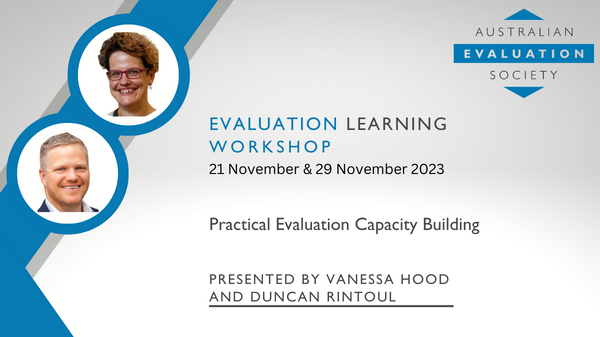Workshop: Practical Evaluation Capacity Building (Online 21 & 29 November 2023)

Workshop: Practical Evaluation Capacity Building
Date and time: Tuesday 21 November & Wednesday 29 November 2023, 11.00am to 2.30pm AEDT (registration from 10.45am). Registrants are to attend both sessions. (full day workshop - 2 sessions)
Venue: Via Zoom. Details will be emailed to registrants just prior to the workshop start time
Facilitator: Vanessa Hood and Duncan Rintoul
Register online by: 20 November 2023. Spaces limited to 25 participants
Fees (GST inclusive): Members $295, Organisational member staff $415, Non-members $485, Student member $140, Student non-member $226. Students must send proof of their full-time student status to
Workshop Overview
This workshop is for anyone interested in evaluation capacity building (ECB). It starts with the big picture of ECB, focusing on needs assessment and the various decisions you need to make when developing an ECB strategy for a team or organisation. Discussion then turns to strategy and tactics – looking not just at professional learning workshops but at other way of building capability (on-the-job coaching, resource development, etc.) as well as systems approaches that create the space for evaluative thinking and practice more broadly. You can expect plenty of facilitated group activities and practical examples to keep you awake and engaged throughout the sessions.
Workshop Content
Through a series of interactive and participatory exercises, you will learn from the facilitators and from other participants about:
-
defining the need for evaluation capacity at different levels of an organisation (e.g. capacity to conduct evaluations vs. commission them vs. ensuring that findings are used)
-
different strategies that can be used to build capacity, and the value of a multi-pronged approach
-
business systems and processes that support evaluative thinking and practice in organisations
-
building capability through training, on-the-job coaching, resource development, communities of practice and more
-
adult learning approaches that help make professional learning exercises ‘sticky’
-
managing and governing ECB programs, including the question of how to evaluate the ECB program itself.
Workshop Outcomes
On completion of this workshop, you will have a broad, applied knowledge of:
-
different options that are available for building evaluation capacity in organisations
-
decision points and deliberative processes when developing an ECB strategy
-
techniques for managing and executing an ECB program well.
Throughout the workshop, you will have the opportunity to set out a proposed approach to ECB in your context. You can immediately start using (or at least consulting on) this plan in your workplace.
PL competencies
This workshop aligns with competencies in the AES Evaluator’s Professional Learning Competency Framework. The identified domains are
-
Domain 1 – Evaluative attitude and professional practice
Who should attend?
This workshop is for anyone who has a role (or would like to develop a role) in evaluation capacity building (ECB), in government, the community sector or business. It is suitable for people who are just starting to design an ECB approach, through to those who have a few years’ experience and are looking to expand their toolkit.
Workshop start times
-
VIC, NSW, ACT, TAS: 11.00am
-
SA: 10.30am
-
QLD: 10.00am
-
NT: 9.30am
-
WA: 8.00am
-
New Zealand: 1.00pm
-
For other time zones please go to https://www.timeanddate.com/worldclock/converter.html
About the facilitators
Vanessa Hood and Duncan Rintoul run Rooftop Social, a small consulting firm that specialises in social research, evaluation, facilitation and capacity building. Both bring deep practical experience in designing and delivering ECB programs in government and non-government organisations. Together, they have run training on evaluation for a wide range of organisations, ranging from Girl Guides Australia and Financial Literacy Australia to the Victorian Country Fire Authority and the Queensland Department of Natural Resources, Mines and Energy.
Vanessa is the former evaluation lead at Sustainability Victoria. She spent much of 2017 as an Evaluation Fellow in the Australian Government Department of Environment and Energy, where she worked with senior and mid-level groups to advance both strategic and technical aspects of evaluative practice in the organsation. Of late, she has been working extensively with NGOs in the financial counselling and financial literacy sectors. Van also delivers the AES workshop on Facilitation for Evaluators.
Duncan has designed and delivered ECB programs for numerous government agencies, including the Victorian Department of Education and Training, the Australian Government Department of Industry and Science, the Australian Communications and Media Authority, Transport for NSW and the NSW Department of Family and Community Services. From 2015-19 he established and led a team responsible for building internal capacity for evaluation and use of evidence across the NSW Department of Education. For a sample of the resources developed as part of this project see https://education.nsw.gov.au/teaching-and-learning/professional-learning/evaluation-resource-hub.
Event Information
| Event Date | 21 Nov 2023 11:00am |
| Event End Date | 29 Nov 2023 2:30pm |
| Cut Off Date | 20 Nov 2023 12:00pm |
| Location | Zoom |
| Categories | Online Workshops |
We acknowledge the Australian Aboriginal and Torres Strait Islander peoples of this nation. We acknowledge the Traditional Custodians of the lands in which we conduct our business. We pay our respects to ancestors and Elders, past and present. We are committed to honouring Australian Aboriginal and Torres Strait Islander peoples’ unique cultural and spiritual relationships to the land, waters and seas and their rich contribution to society.
